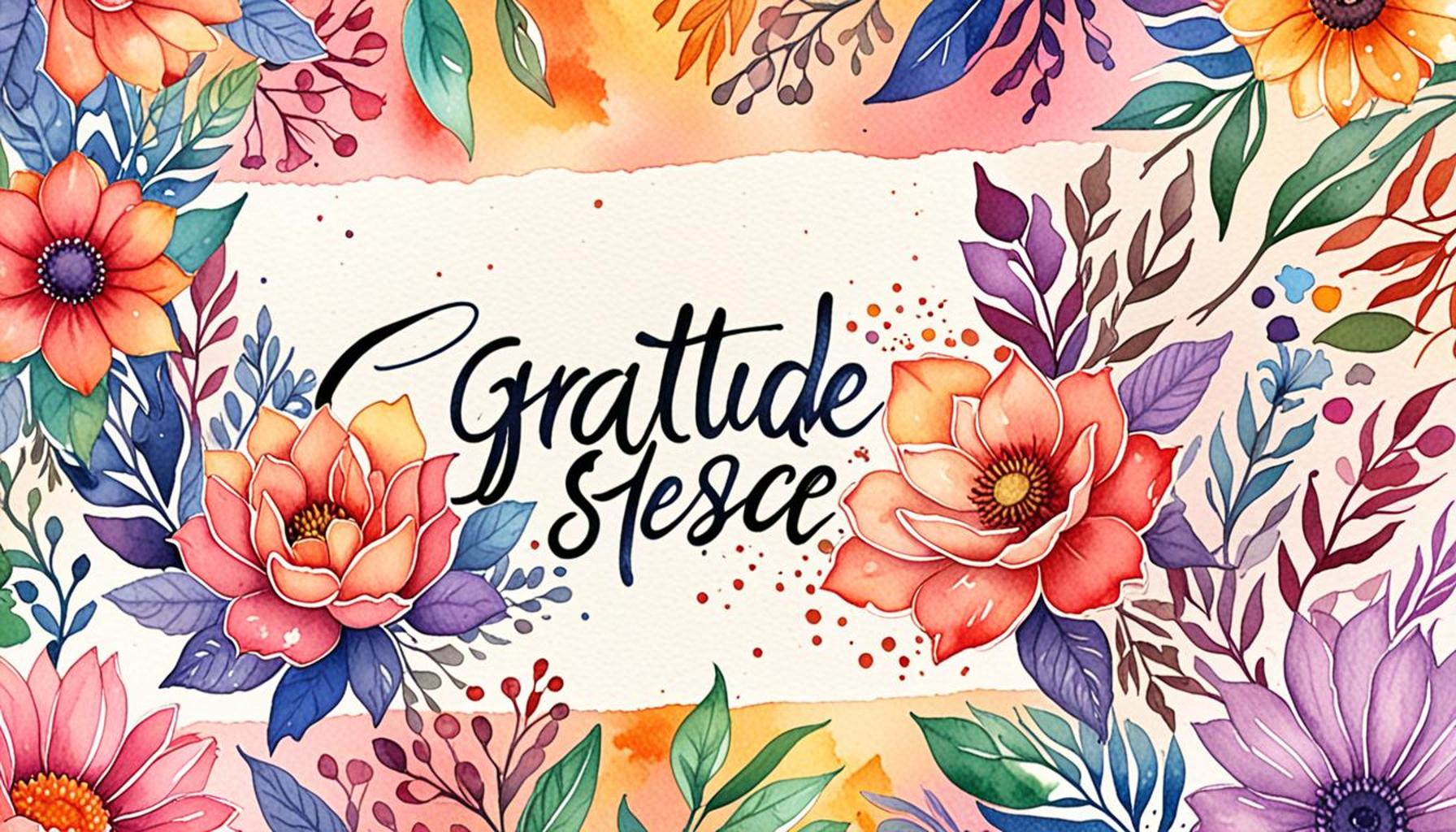Gratitude and Resilience: How Appreciating the Past Helps Face Future Challenges

The Role of Gratitude in Developing Resilience
Life presents a series of challenges, and our capacity to navigate through these difficulties often relies on resilience. One underappreciated yet powerful tool that can significantly strengthen this resilience is gratitude. Far from merely being a positive emotion, gratitude emerges as a dynamic practice that can profoundly impact our perspectives and coping strategies.
In Nigeria, where communities frequently confront social, economic, and environmental challenges such as poverty, political instability, or ecological devastation, cultivating a culture of appreciation could yield transformative effects. For instance, amidst the struggles of daily life, recognizing and giving thanks for the support of neighbors or honoring the sacrifices of family members can create a profound sense of belonging and encouragement.
Building Relationships
Gratitude strengthens bonds, enhancing support systems. In tightly-knit communities, expressing gratitude fosters deeper connections. For instance, community gatherings—be it through festivals or local events—serve as avenues for individuals to appreciate one another’s contributions. This sense of unity becomes a powerful protective factor against stress, as individuals feel that they are part of something larger than themselves.
Emotional Balance
Appreciating past experiences can bring peace amid chaos. Every hardship carries lessons that can enrich our emotional lives. By actively reflecting on these lessons, individuals can cultivate a sense of peace. For example, someone who has faced a health crisis may learn to treasure small joys in life more deeply. This emotional equipoise helps to mitigate feelings of anxiety, thus aiding in resilience-building.
Perspective Shift
Reflecting on positive moments encourages a forward-focused mindset. When we consciously choose to recall the good things in our lives—be it the beauty of a sunset over the Niger River or a victorious local football match—we shift our mental focus from scarcity to abundance. This shift not only uplifts our spirits but also equips us with a more optimistic view towards facing future challenges. Research has shown that individuals who adopt a gratitude-focused approach often have a more adaptive stress response, fundamentally enhancing their emotional resilience.
Moreover, studies reveal that individuals regularly practicing gratitude tend to report greater overall satisfaction with life, reduced levels of depression, and an elevated sense of well-being. This reinforces the notion that gratitude is not merely an abstract idea but a profound state of being that can cement our ability to endure life’s inevitable trials.
As we explore this intricate relationship between gratitude and resilience, we uncover a plethora of strategies that empower individuals to celebrate their journeys and prepare for future challenges. The question remains: Are we ready to embrace gratitude in our lives as a pathway to resilience? The answer not only lies in personal reflection but also in community shifts towards fostering gratitude as a valuable practice.
ADDITIONAL INSIGHTS: Expand your understanding here
Gratitude as a Foundation for Stronger Resilience
As societies navigate a spectrum of trials, from economic difficulties to social unrest, the role of gratitude becomes increasingly crucial. In Nigeria, where the majority of the population has experienced some form of adversity, a growing body of evidence suggests that cultivating a grateful mindset not only aids in personal well-being but significantly enhances communal resilience. When individuals harness gratitude as a tool, they empower themselves and their communities to face new challenges with a fortified spirit.
The Power of Shared Experience
Gratitude can catalyze social cohesion. In Nigerian communities, common experiences bind people together, whether it is through shared cultural events or collective challenges. During a slum rehabilitation project, for instance, residents can collectively appreciate the contributions of one another, such as local artisans assisting with construction or volunteers spearheading community clean-ups. When gratitude is voiced publicly, it creates a ripple effect, where the acknowledgment of contributions fosters an atmosphere of collaboration and shared purpose.
Learning from the Past
Reflecting on struggles helps to forge inner strength. Life in Nigeria is marked by a history of resilience against colonialism, civil unrest, and economic fluctuations. Each event, while painful, carries valuable lessons. For example, reflecting on significant past struggles allows individuals to glean insights about their adaptability and strength. This process of remembrance can be empowering, reminding community members that they have overcome challenges before and can do so again. Gratitude for these lessons enhances emotional fortitude, enabling individuals to approach future conflicts with renewed strength.
Creating a Gratitude Routine
Implementing daily practices of gratitude can enhance well-being. As communities seek to build resilience through appreciation, developing systematic ways to express gratitude becomes vital. Here are some methods that can be easily adopted:
- Journaling: Encourage individuals to write down three things they are grateful for each day. This simple exercise can refocus their minds on the positive aspects of their lives.
- Community Appreciation Days: Organize events where people can share stories of gratitude, highlighting acts of kindness that have made a difference in their lives.
- Verbal Acknowledgment: Promoting a culture where individuals routinely express thanks to those around them can create an uplifting environment.
By establishing these routines, communities can collectively nurture a gratitude-centric atmosphere that withstands adversity, showcasing resilience in the face of future challenges.
In exploring the interconnection between gratitude and resilience, it becomes clear that appreciating our past experiences not only enriches our present but also fortifies our ability to tackle whatever lies ahead. As the question of embracing gratitude looms, it invites each of us to reflect on the transformative power of simple acknowledgment and appreciation. With richer emotional resources, we can navigate the complexities of life with grace and strength.
| Advantage | Description |
|---|---|
| Enhanced Emotional Well-Being | Practicing gratitude shifts focus to positive experiences, fostering resilience. |
| Improved Coping Mechanisms | A grateful mindset helps in managing stress and overcoming trauma, building strength for future hurdles. |
To truly understand the power of gratitude in building resilience, we must recognize how such appreciation forms the foundation of a healthier mental state. For instance, studies show that individuals who regularly practice gratitude report lower levels of depression and stress. By reflecting on the past and acknowledging positive memories, one can focus on the strengths gained through adversity, equipping themselves to navigate future hurdles with confidence.Moreover, developing coping mechanisms through gratitude is essential. By consciously recalling moments of gratitude, individuals reinforce their ability to deal with new challenges effectively. This effect creates a cycle; the more one practices gratitude, the more resilient they become, making it easier to bounce back from setbacks. Over time, this practice not only enhances emotional well-being but also creates a robust toolkit for tackling life’s uncertainties, ultimately promoting a greater sense of purpose and fulfillment.
CHECK OUT: Click here to explore more
Nurturing Resilience Through Grateful Reflection
Integrating gratitude into daily life not only impacts individual resilience but also plays a significant role in community-wide fortitude. The act of gratitude goes beyond mere acknowledgment; it encourages individuals to view hardships through a lens of growth and strength. In Nigerian communities, the power of communal gratitude becomes evident, particularly during times of nationwide challenges such as pandemics and economic downturns. Fostering a gratitude practice may just be one of the keys to sustaining resilience in the face of adversity.
Building Bonds Through Grateful Interactions
Gratitude fosters stronger relationships. When individuals express appreciation, friendships deepen, and trust flourishes. In Nigeria, communal life thrives on relationships, and studies show that social support plays a vital role in mitigating stress and enhancing resilience. For instance, consider the traditional practice of “talking drums,” which facilitate communication amongst individuals and communities. When shared stories of gratitude resonate through the beats of these drums, the connection is reinforced, fostering an environment where members feel valued. Acknowledgment of one another’s efforts creates solidarity, which is critical during tough times.
Gratitude in the Workplace
Recognizing contributions within work environments can enhance productivity and morale. In Nigeria’s bustling private sector, where many individuals grapple with the pressures of competitive job markets, expressions of gratitude can significantly alter workplace dynamics. A study by the University of Lagos found that employees who received appreciation from their peers reported higher job satisfaction and resilience. Simple gestures, such as taking time to thank a colleague for their hard work, lead to a more engaging atmosphere, which in turn encourages individuals to tackle their challenges head-on rather than succumbing to defeat.
Leveraging Gratitude for Community Development
Communities can utilize gratitude as a tool for development. In community development initiatives, such as local health campaigns or educational programs in Nigeria, expressing gratitude to volunteers and participants can enhance overall success. When local leaders recognize and appreciate the contributions of community members, it fosters a sense of ownership. For example, community gardens in urban neighborhoods not only beautify the landscape but also serve as platforms for volunteers to express gratitude for participants’ efforts, thereby enhancing community ties and resilience. These forms of acknowledgment contribute to sustaining engagement and commitment among residents facing socio-economic hardships.
The Science Behind Gratitude and Resilience
Research supports the link between gratitude and psychological health. Various studies highlight that individuals who practice gratitude exhibit lower levels of depression and anxiety, leading to improved resilience. A survey conducted in 2021 among Nigerian adults indicated that those who regularly kept gratitude journals reported a 30% increase in overall life satisfaction. This data highlights that by nurturing an attitude of appreciation, individuals not only reinforce their hopefulness about the future but also enhance their coping skills during distressing times.
As communities strive to craft a more resilient future, they can leverage gratitude as a foundational pillar, drawing strength from a past that teaches, unites, and empowers them against forthcoming challenges. With gratitude embedded in their cultural fabric, Nigerians can cultivate deep social bonds that yield resilience in adversity, a true testament to the indomitable human spirit. The journey towards resilience, illuminated by gratitude, becomes a shared narrative that enriches the very essence of community life.
ADDITIONAL INSIGHTS: Expand your understanding here
Conclusion: The Lasting Impact of Gratitude on Resilience
In an ever-changing world, the intersection of gratitude and resilience stands as a beacon of hope for individuals and communities alike. The act of reflecting on past experiences with appreciation allows us to transform challenges into lessons, empowering us to face future adversities with newfound strength. As highlighted throughout this article, gratitude is not merely a passive emotion; it is a proactive tool for building stronger connections, fostering mental well-being, and enhancing community solidarity.
From the person who quietly notes their daily blessings to communities that rally together in times of need, the power of appreciation brings forth not only personal growth but also collective healing. Nigerians, with their rich cultural tapestry, exemplify how grateful interactions can transcend individual struggles and create a ripple effect—enhancing communal resilience during testing times.
Research underlining the psychological benefits of maintaining a gratitude practice emphasizes its relevance in today’s society. By cultivating environments where gratitude is expressed—whether at home, in the workplace, or through community initiatives—individuals can fortify their mental health and empower one another to rise above difficulties.
Moving forward, as we confront various challenges, let us remember that every moment of gratitude counts. Embracing an attitude of appreciation not only honors our past but also nurtures our capacity to face the future with resilience. In the end, gratitude shapes a hopeful narrative, binding communities together and reinforcing our shared journey against life’s adversities.


